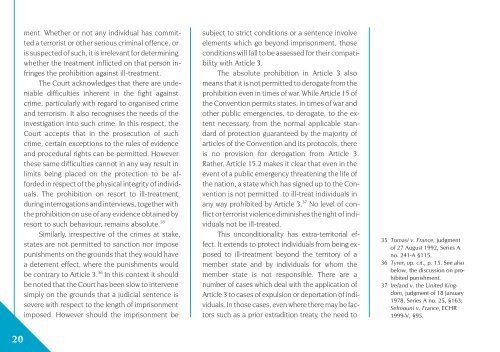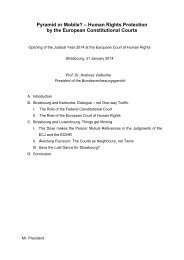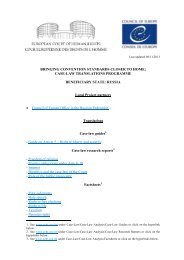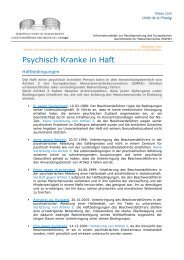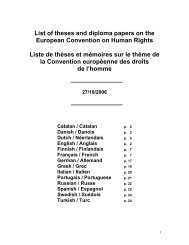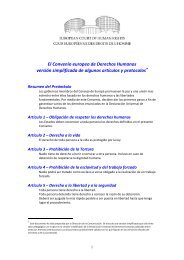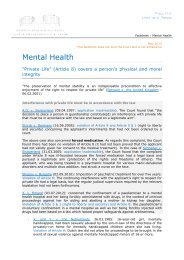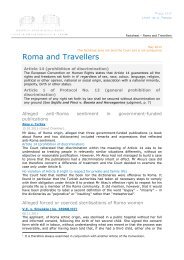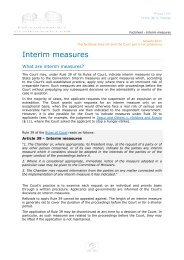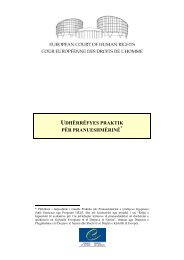The prohibition of torture - European Court of Human Rights
The prohibition of torture - European Court of Human Rights
The prohibition of torture - European Court of Human Rights
You also want an ePaper? Increase the reach of your titles
YUMPU automatically turns print PDFs into web optimized ePapers that Google loves.
ment. Whether or not any individual has committed<br />
a terrorist or other serious criminal <strong>of</strong>fence, or<br />
is suspected <strong>of</strong> such, it is irrelevant for determining<br />
whether the treatment inflicted on that person infringes<br />
the <strong>prohibition</strong> against ill-treatment.<br />
<strong>The</strong> <strong>Court</strong> acknowledges that there are undeniable<br />
difficulties inherent in the fight against<br />
crime, particularly with regard to organised crime<br />
and terrorism. It also recognises the needs <strong>of</strong> the<br />
investigation into such crime. In this respect, the<br />
<strong>Court</strong> accepts that in the prosecution <strong>of</strong> such<br />
crime, certain exceptions to the rules <strong>of</strong> evidence<br />
and procedural rights can be permitted. However<br />
these same difficulties cannot in any way result in<br />
limits being placed on the protection to be afforded<br />
in respect <strong>of</strong> the physical integrity <strong>of</strong> individuals.<br />
<strong>The</strong> <strong>prohibition</strong> on resort to ill-treatment<br />
during interrogations and interviews, together with<br />
the <strong>prohibition</strong> on use <strong>of</strong> any evidence obtained by<br />
resort to such behaviour, remains absolute. 35<br />
Similarly, irrespective <strong>of</strong> the crimes at stake,<br />
states are not permitted to sanction nor impose<br />
punishments on the grounds that they would have<br />
a deterrent effect, where the punishments would<br />
be contrary to Article 3. 36 In this context it should<br />
be noted that the <strong>Court</strong> has been slow to intervene<br />
simply on the grounds that a judicial sentence is<br />
severe with respect to the length <strong>of</strong> imprisonment<br />
imposed. However should the imprisonment be<br />
subject to strict conditions or a sentence involve<br />
elements which go beyond imprisonment, those<br />
conditions will fall to be assessed for their compatibility<br />
with Article 3.<br />
<strong>The</strong> absolute <strong>prohibition</strong> in Article 3 also<br />
means that it is not permitted to derogate from the<br />
<strong>prohibition</strong> even in times <strong>of</strong> war. While Article 15 <strong>of</strong><br />
the Convention permits states, in times <strong>of</strong> war and<br />
other public emergencies, to derogate, to the extent<br />
necessary, from the normal applicable standard<br />
<strong>of</strong> protection guaranteed by the majority <strong>of</strong><br />
articles <strong>of</strong> the Convention and its protocols, there<br />
is no provision for derogation from Article 3.<br />
Rather, Article 15.2 makes it clear that even in the<br />
event <strong>of</strong> a public emergency threatening the life <strong>of</strong><br />
the nation, a state which has signed up to the Convention<br />
is not permitted to ill-treat individuals in<br />
any way prohibited by Article 3. 37 No level <strong>of</strong> conflict<br />
or terrorist violence diminishes the right <strong>of</strong> individuals<br />
not be ill-treated.<br />
This unconditionality has extra-territorial effect.<br />
It extends to protect individuals from being exposed<br />
to ill-treatment beyond the territory <strong>of</strong> a<br />
member state and by individuals for whom the<br />
member state is not responsible. <strong>The</strong>re are a<br />
number <strong>of</strong> cases which deal with the application <strong>of</strong><br />
Article 3 to cases <strong>of</strong> expulsion or deportation <strong>of</strong> individuals.<br />
In those cases, even where there may be factors<br />
such as a prior extradition treaty, the need to<br />
35 Tomasi v. France, judgment<br />
<strong>of</strong> 27 August 1992, Series A<br />
no. 241-A §115.<br />
36 Tyrer, op. cit., p. 15. See also<br />
below, the discussion on prohibited<br />
punishment.<br />
37 Ireland v. the United Kingdom,<br />
judgment <strong>of</strong> 18 January<br />
1978, Series A no. 25, §163;<br />
Selmouni v. France, ECHR<br />
1999-V, §95.<br />
20


